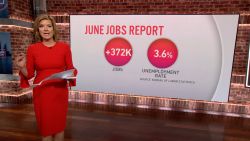Google employees won’t be heading back to the office any time soon.
More from Success
The company told workers on Monday that they can work from home until July 2021.
“To give employees the ability to plan ahead, we’ll be extending our global voluntary work from home option through June 30, 2021 for roles that don’t need to be in the office,” Google CEO Sundar Pichai wrote in a memo to employees, a copy of which was obtained by CNN Business. “I hope this will offer the flexibility you need to balance work with taking care of yourselves and your loved ones over the next 12 months.”
And we can expect more companies, particularly its Silicon Valley neighbors, to make similar announcements.
“Google is a trendsetter,” said Mauro Guillén, a management professor at The Wharton School of the University of Pennsylvania and author of the forthcoming book “2030: How Today’s Biggest Trends Will Collide and Reshape the Future of Everything.”
And the competition is always paying attention.
“The first thing that will go through every [Silicon Valley] executive’s and human resources teams’ minds is: When do we introduce a policy that matches or beats it?” said Arran Stewart, co-founder of Job.com.
He added that Google has now set a new benchmark for other tech companies. “These guys are all about a battle of talent. They can’t afford not to do at least the same or more, or people leave.”
But Google still didn’t go as far as companies like Twitter (TWTR) and Facebook (FB) that have already announced that some employees will work from home permanently.
Twitter said in May it will allow some of its workforce to continue working from home “forever” if they want.
Facebook CEO Mark Zuckerberg said as many as 50% of the company’s employees could be working remotely within the next five to 10 years.
But Google’s announcement still sets the stage for potentially making remote work permanent, noted Guillén.
An easy shift to remote work
While the flexibility of working from home has obvious benefits for employees, remote workers also give companies access to a much wider talent pool.
“This is potentially something that could create – for certain industries – a truly global labor market,” Guillén said.
Extending a remote work policy makes sense given Google’s large scale of knowledge workers, according to Bill Castellano, a professor in the Rutgers School of Management and Labor Relations and a former human resources executive.
“Companies with those kinds of workers really lend themselves well to a remote schedule” he said. “Google employees have always had a tremendous amount of flexibility.”
For companies who are planning to make work-from-home succeed for the long haul, there has to be a focus on measurable outcomes, he added.
That means managers need to lay out objectives and time frames and give employees the freedom to get things done when required.
Who suffers
A permanent shift to remote work could hurt commercial real estate in New York City and parts of California, especially if other big companies followed suit, said Guillén.
“If all [Google’s] people can operate for a year remotely, maybe a year from now they will say: ‘Maybe we don’t need all this office space after all.’”
Another group of people who might not welcome Google’s announcement are all the small businesses that surround its offices.
“This is devastating news for them,” Guillén said. “Google employees aren’t going to be going to the hot dog place around the corner, shopping or taking public transportation. That is really bad for those neighborhoods and areas where Googlers would commute.”
























